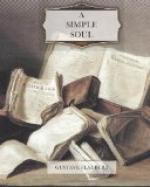Summer and winter she wore a dimity kerchief fastened in the back with a pin, a cap which concealed her hair, a red skirt, grey stockings, and an apron with a bib like those worn by hospital nurses.
Her face was thin and her voice shrill. When she was twenty-five, she looked forty. After she had passed fifty, nobody could tell her age; erect and silent always, she resembled a wooden figure working automatically.
CHAPTER II
Like every other woman, she had had an affair of the heart. Her father, who was a mason, was killed by falling from a scaffolding. Then her mother died and her sisters went their different ways; a farmer took her in, and while she was quite small, let her keep cows in the fields. She was clad in miserable rags, beaten for the slightest offence and finally dismissed for a theft of thirty sous which she did not commit. She took service on another farm where she tended the poultry; and as she was well thought of by her master, her fellow-workers soon grew jealous.
One evening in August (she was then eighteen years old), they persuaded her to accompany them to the fair at Colleville. She was immediately dazzled by the noise, the lights in the trees, the brightness of the dresses, the laces and gold crosses, and the crowd of people all hopping at the same time. She was standing modestly at a distance, when presently a young man of well-to-do appearance, who had been leaning on the pole of a wagon and smoking his pipe, approached her, and asked her for a dance. He treated her to cider and cake, bought her a silk shawl, and then, thinking she had guessed his purpose, offered to see her home. When they came to the end of a field he threw her down brutally. But she grew frightened and screamed, and he walked off.
One evening, on the road leading to Beaumont, she came upon a wagon loaded with hay, and when she overtook it, she recognised Theodore. He greeted her calmly, and asked her to forget what had happened between them, as it “was all the fault of the drink.”
She did not know what to reply and wished to run away.
Presently he began to speak of the harvest and of the notables of the village; his father had left Colleville and bought the farm of Les Ecots, so that now they would be neighbours. “Ah!” she exclaimed. He then added that his parents were looking around for a wife for him, but that he, himself, was not so anxious and preferred to wait for a girl who suited him. She hung her head. He then asked her whether she had ever thought of marrying. She replied, smilingly, that it was wrong of him to make fun of her. “Oh! no, I am in earnest,” he said, and put his left arm around her waist while they sauntered along. The air was soft, the stars were bright, and the huge load of hay oscillated in front of them, drawn by four horses whose ponderous hoofs raised clouds of dust. Without a word from their driver they turned to the right. He kissed her again and she went home. The following week, Theodore obtained meetings.




